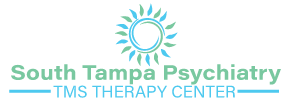Transcranial magnetic stimulation (TMS) therapy is a type of therapy that introduces targeted magnetic pulses to a patient’s brain to support more positive emotions. Traditionally, experts have employed TMS therapy in treating depression when medication has been insufficient in producing results. However, TMS therapy is also commonly used to treat anxiety. Learn more about TMS therapy for anxiety by calling South Tampa Psychiatry at 866.273.5017.
Depression and Anxiety
The predominant usage of TMS therapy is for depression. Using it to treat anxiety is becoming increasingly common due to the confluence between depression and anxiety. The biggest reason is the significant overlap between their symptoms, and more than half of the people with depression also have an anxiety disorder.
Moreover, TMS therapy targets frontal and left brain centers responsible for emotional regulation that generally influences mood disorders. At times though, anxiety can be separate from depression. In these cases, anxiety therapy may target right brain areas to rebalance a person’s emotional responses.
TMS Therapy for Anxiety
A psychiatrist may recommend TMS therapy to treat anxiety following other attempts to alleviate symptoms, such as medications or cognitive-behavioral therapy. It is noninvasive, and treatments last for less than an hour. The most common side effect is a slight headache following an instance of treatment.
A course of TMS therapy can reduce anxiety symptoms such as:
- Worry
- Irritability
- Restlessness
- Shortness of breath
- Insomnia
- Sweating
How quickly patients experience the positive effects depends on the type and severity of their anxiety disorder. Some people notice positive impacts within a week or two of starting TMS therapy.
Other Anxiety Therapies
TMS therapy is just one of many evidence-based anxiety therapies. Some people find the most significant benefit from engaging in multiple therapeutic interventions at the same time. One of the most common therapies for anxiety is cognitive-behavioral therapy. This approach works to root out negative thought and behavior patterns, ultimately replacing them with more positive ones.
Cognitive-behavioral therapy follows three general steps:
- Identifying negative thoughts or behaviors
- Challenging the negative thoughts or behaviors
- Replacing the negative thoughts or behaviors with more productive ones
Another standard therapy for dealing with anxiety is exposure therapy. This method is perhaps most commonly seen in treating phobias and utilizes a process called systematic desensitization. That means patients are slowly exposed to versions of their phobia to face their fear without an overwhelming anxiety response eventually. For example, someone with a fear of spiders may begin by looking at a photo of spiders. Next, they may encounter a plastic toy spider. This process slowly escalates until they can fully face their fear without an overwhelming anxiety response.
Lifestyle Changes to Support Anxiety Treatment
In addition to formal therapy and possibly medication, specific lifestyle changes can contribute to alleviating anxiety. The first of these is regular exercise, which is a natural stress reliever. Research indicates as little as 30 minutes of exercise a few times a week can significantly impact a person’s experience with anxiety.
Many people also experience benefits from relaxation techniques like mindfulness or meditation. Two more options are biofeedback and hypnosis. Biofeedback is the process of learning to recognize your anxiety response and begin to control it. Meanwhile, hypnosis is sometimes combined with cognitive-behavioral therapy to put patients in a state of relaxation before tackling their fears or anxieties.
Seek Treatment at South Tampa Psychiatry
South Tampa Psychiatry specializes in a range of anxiety therapies, including TMS therapy for anxiety. Mental illness doesn’t need to hold you back from living the life you’ve always wanted. Our expert practitioners and cutting-edge methods can get you back to feeling your best. Beyond treating anxiety, we offer high-quality treatment programs for mental health and addiction that can address depression, bipolar disorder, substance abuse, and more. Contact us at 866.273.5017 to determine how TMS therapy in Florida can benefit you or someone you love.







